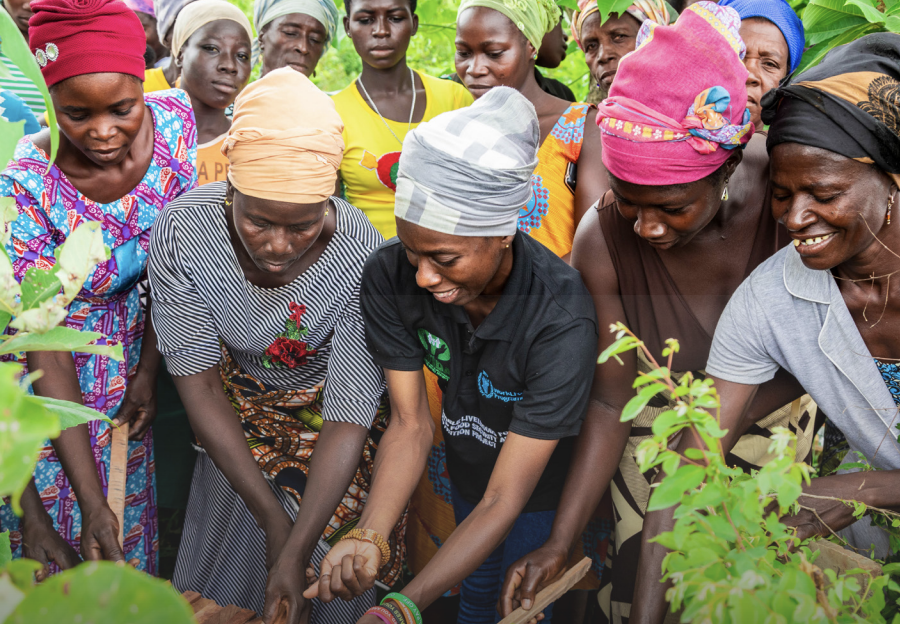Factsheet for Young People: Gender & Adaptation

Introduction
The climate crisis is not gender-neutral, and neither should our adaptation efforts be.
Women and men experience different levels of exposure, vulnerability and resilience to climate risk and climate change impacts due to differences in rights, responsibilities, and opportunities. Social norms compound these constraints by restricting women’s freedom of movement, choice and voice. Women experience differing vulnerabilities due to differences in workload, in access to and control over resources, and participation in decision-making. Women’s vulnerability differs not only because of gender, but also ethnicity, religion, class, location and age.
This factsheet is part of a series that presents information from GCA’s flagship reports State and Trends in Adaptation in Africa 2021 and 2022. It aims to disseminate key adaptation information to young people and showcase youth-led adaptation action from across Africa.
This article is an abridged version of the original text, which can be downloaded from the right-hand column. Please access the original text for more detail, research purposes, full references, or to quote text.
Good practices: Youth-led adaptation solutions
Composting and weeds management training for women small holder farmers in Lubumbashi
Climate change impacts such as low rainfall are causing reduced crop yields in Lubumbashi in the Democratic Republic of the Congo, leading to insecurity of income and food provision for many households. Marondji Bukoko Pacy, a trainee of GCA’s Online Executive Training for Young Women Leadership on Climate Adaptation, aims to tackle these challenges and improve the life conditions of young women in her local community.
This project tackles soil degradation caused by extensive mining and improves water efficiency by training 50 women smallholder farmers. The project is expected to improve food security through climate-smart agriculture, supporting green job creation and climate adaptation. Moreover, this project will foster the capacity of women small-holder farmers and housewives to generate their own income and sustain their households for thriving livelihoods, contributing to gender equality and an inclusive economy. Find out more.
Online executive training – young women leadership on climate adaptation
The Online Executive Training – Young Women Leadership on Climate Adaptation empowers young women across Africa to unleash their full potential and capabilities to contribute to and drive adaptation solutions. The pilot cycle trained 30 young women from the Democratic Republic of the Congo, Egypt, Ghana, Kenya, Nigeria and Zimbabwe who cultivated their potential for innovation by developing micro adaptation projects focused on agriculture and food security, gender empowerment and water management, fostering their leadership skills and making their communities more climate resilient. The training contributed to building young women’s leadership in climate adaptation through delivering adaptation education, coaching for adaptation project management, and providing networking skills and opportunities. Find out more about the Online Executive Training.
Key Policy Messages
It is important to be sensitive to gender issues when preparing for and responding to climate change. To this end, there are a number of proven, promising and innovative strategies that can be used to take into account women’s and men’s respective capacities, power, social resilience, vulnerabilities and resources as a consequence of gender norms, roles and relations.
- It is crucial to have women represented in decision-making at all levels in order to be able to influence innovative, sustainable solutions to climatic challenges.
- It is essential to promote women’s access to knowledge related to climate change across all the relevant sectors and strengthen women’s decision-making abilities.
- More funding at grassroots levels will help empower women.
- To track progress, it is essential to develop tools/methodologies/ guidelines and indicators for the monitoring, reporting and verification of the development and implementation of gender-responsive climate policies.
- Governments need support to build their capacity to integrate gender into national adaptation and mitigation plans, and into sectoral plans and programs through training in gender-responsive policy analysis, policy development, planning, budgeting, implementation, monitoring and evaluation.
To explore the policy messages in more detail, as well as the main barriers to resolving gender inequalities, key numbers, and climate change impacts on women please refer to the factsheet.
Suggested Citation:
Salaudeen, B., Li, C. and Mebwana, S. (2023). Factsheet for young people: Gender. Available at: https://gca.org/reports/https-gca-org-wp-content-uploads-2023-06-gca-factsheet_gender-pdf/
Related resources
- Gender and Climate Change Adaptation: A flexible training package
- Toward Gender-Responsive Ecosystem-Based Adaptation - Why it’s needed and how to get there
- Gender and Environment CC:e-Learn course
- Advancing Gender Equality and Climate Action: A Practical Guide to Setting Targets and Monitoring Progress
- Gender-Responsive National Adaptation Plan (NAP) Processes: Progress and promising examples
(0) Comments
There is no content